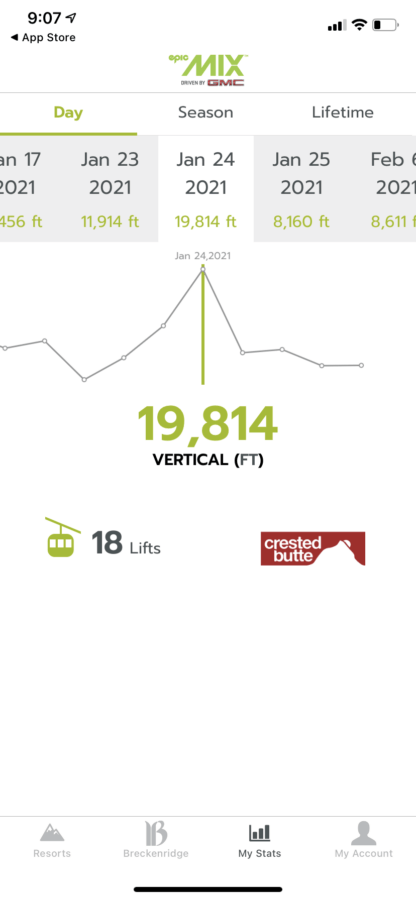One of my favorite hobbies is skiing. My wife and I love it so much we’ve made it a priority in our lives, and our almost two year old has already been on skis.
I was recently skiing at Breckenridge, which is about 1h45m from Denver. It was a powder day with about 4-6 inches of fresh snow on the ground.
For one lift ride, I was on the same chair as two snowboarders. It was a six seater, but only the three of us because during pandemic times they’re only allowed to load people from two parties and if that’s the case then only five people.
As we rode the two guys were discussing which run they would take. They decided and then agreed that they’d just point straight down the mountain, no turning allowed.
Then one guy said “my goal is to go faster than 67 miles an hour.”
This was not dissimilar to a guy I rode the same lift with last year who told me his goal was 40,000 feet of vertical feet skied that day. Once again, it was a powder day.
Now I have no problem with the guys who wanted to go a certain speed or the guy who was lapping the black diamond right under the lift to get a certain number of vertical feet in that day. In fact, the Epic Pass encourages this sort of thing, as they have a vertical feet measurement at the bottom of every lift telling you how many you’ll ski if you go to the top and come back down.
These guys are having fun. What they’re doing isn’t hurting anyone. So far be it from me to say they shouldn’t be doing it. I honestly couldn’t care less.
But their approach does tell me a few things.
First, I know that they’re not concerned about the fresh powder to be harvested in secret stashes known by locals. So, we probably wouldn’t be best buds on the slopes.
And second, their metrics they are chasing don’t really tell me how good of a rider they are. I do know that the first guys can go fast and the second guy’s legs are quite strong to be able to take those 40-ish laps.
While these guys are of course free to do as they please, the fact that they can go fast or ski a lot of laps doesn’t really tell me how technically good of riders or skiers they are.
Can they ski bumps well? Can they link turns well? Can they carve well? How are they in the trees? What about the terrain park?
Now, skiing/snowboarding are of course hobbies. They’re meant to be enjoyed and different people enjoy them in different ways.
Table of Contents
Business is different.
Entrepreneurs launch businesses in order to grow them and succeed financially while making a difference in our lives, our team’s lives, and the lives of our customers.
If you’re an employee, your job isn’t just to do things. Your job is a role that should map towards revenue either directly or indirectly.
For example, if you’re a marketing manager then you’re not just responsible for making sure good content is written and published.
You’re responsible for that content driving traffic, leads, and revenue! If your work doesn’t do that, then you’re not doing your job and you won’t keep it very long. If you don’t publish content then you’re not going to hit your goals, but just publishing content isn’t enough.
Your job is to be effective in driving business results.
Notice I said business results. I make this distinction because a lot of people unfortunately have realized that they can appear to drive “results” when in actuality they’re just “doing things”, and they’ve learned that their boss doesn’t hold them accountable to business results anyways.
In business, I see two types of metrics:
- Those that you watch more carefully to make sure everything is on track
- Those you report on because they’re the metrics that drive the business (and that execs care about)
The first I call “directional metrics”. These are metrics that matter to the individual contributors who are in the weeds doing the work.
The second are the business metrics.
As an example, when I worked in-house we’d report to the Zillow executive team every month. We reported across the various channels, such as SEO and email and content.
But at the end of the day our executives had one metric that mattered – Unique Users (UUs). This metric mattered because Zillow, as a media company, sold against and talked publicly about audience to drive PR and other channels. We were at the beginning of making major in-roads to the rentals market, and so were investing heavily in acquisition efforts, which is why I built my team from myself to 8 people in about 12 months.
We reported on Unique Users month on month and year on year (because we had major seasonality in traffic which made month on month numbers need major caveats some months) as our main leading metric. We also reported on metrics like links built, important rankings increases, leads from new marketing initiatives like new email templates or new email campaigns launched, traffic from content (as we were investing in content heavily), and more.
Those were good numbers to talk about with our bosses, our marketing superiors, who understood them, but I’d never report number of links built to a board. I’d talk about the main UUs metric and what that means for our position in the market.
Why reporting metrics matter
Reporting on and measuring the right metrics matters because this is how you determine where to make investments or not. Oftentimes we as marketers are reporting our activities and what they mean for the business to non-marketers who are then making decisions for the business off what we are reporting.
If we are not reporting the right metrics, then we are not giving them what they need to make good decisions. And if they’re not able to make good decisions, the business is less likely to do well.
I should also mention that by reporting things that don’t matter, we’re doing ourselves as marketers a disservice. This leads to executives saying “marketing is worthless”, when in reality we may actually be doing a good job (or we may not be, in which case…)
We need to move from vanity bad metrics to good metrics.
- Number of blog posts -> new traffic acquired and how that compares
- Domain Authority -> share of voice in the search results
- Links built -> revenue generated
Good marketing metrics
So what metrics should you be tracking and reporting on?
Keeping in mind that there are your leading metrics that you watch daily/weekly and the business metrics that matter, you need a mix of both.
As a marketer your job is to drive audience which then converts into whatever the business’s core conversion is, whether ecommerce sales or leads or subscriptions. Of course, no team should be working in a silo and often these metrics are shared across teams as a partnership. Turf wars between teams never end well.
Here are the marketing metrics you should be reporting on:
- Audience and changes month on month (MoM) and year on year (YoY), especially in businesses with seasonal traffic.
- Revenue from marketing initiatives and how that has changed over time (with shoutouts to other teams you’ve been working in tandem with).
- Acquisition cost and profitability by channel.
I do also like to share wins (“we launched this email which drove $XXX,XXX in incremental revenue last month”) as those keep people motivated and give executives things to talk about.
Bad marketing metrics
To follow up and complete the circle, what metrics should you not be leaning on as something to report?
You should not be measuring your marketing progress against anything that does not map directly to the main business metrics.
For example, here are some metrics I’ve seen agencies touting that are just worthless:
- Domain Authority (this is a relative metric that can change without you doing anything or in spite of you doing things)
- Google Ad campaign optimization score (yes, really)
- Number of pieces of content produced (did it drive traffic? who cares!)
- Anything around social media likes or engagement
- Time on site and bounce rates
Don’t get me wrong, these can be fine things to watch as they can be directional pointing to deeper things going on. But they are not something to be reporting on.



